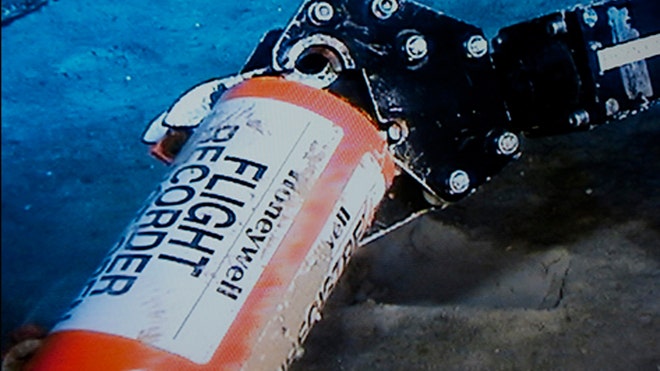http://www.foxnews.com/tech/2014/03/10/missing-jet-raises-questions-real-time-black-boxes/Missing jet raises questions about real-time black boxes
Published March 10, 2014
FoxNews.com

May 1, 2011: A mechanical arm, seen in this image published on the web site of France's BEA air accident inquiry offic, holds an orange cylindrical flight data recorder above the sand. (Reuters)
As rescuers continue searching for Malaysian Airlines flight 370, attention is turning to high-tech flight data recorders for answers – and the same questions many have raised for years are resurfacing.
Could better black boxes save lives? Could they at least help locate the missing Boeing 777? And if the technology is so good, why isn’t it required by law?
“There’s not a good answer to that,” said Richard Hayden, director of Flyht Aerospace Solutions. “The airlines always plead poverty -- it’s too expensive, too cumbersome, they don’t have the bandwidth to handle it.”
Hayden’s company makes a next-generation black box system called AFIRS (Automated Flight Information Reporting System), so advanced that it can be reprogrammed in-flight, at 30,000 feet, by beaming new commands to it off satellites.
The AFIRS system transmits a plane’s position every 5 to 10 minutes via the Iridium satellite network, and every second when it detects an abnormality. But the system also records a vast array of data from the flight such as pressures, engine parameters, flap positions and altimeters.
That information would have helped officials immediately see some of the contextual information leading to the disappearance of the Malaysian Airlines flight, such as whether it was turning or maneuvering to avoid another plane.
Hayden’s system is currently installed on about 350 planes run by 40 different operators and the three biggest carriers in China are using it or plan to, he said. Not so for the big U.S. carriers, however.
“They’re excused, I would have to say, because there’s a lot of confusion over what it does versus what others do,” Hayden told FoxNews.com. Many current planes in America use ACARS (the Aircraft Communication and Recording System), a decades-old system that required very expensive infrastructure and training when the airlines first installed it. It is essentially a digital link for text messages, but can’t handle flight data.
Given that heavy investment, Hayden said, the hesitation is understandable.
There are other issues as well with advanced, real-time data transmitters, notably the sheer volume of data from just one plane, explained Robert Mark, a commercial pilot and aviation expert.
“Multiply the bandwidth you would need to transmit just one aircraft -- let alone that there would be thousands in the air at any one time -- it’s pretty overwhelming,” Mark told Fox News.
CNN recently reported that the advanced data recorders would require a massive investment in data centers to house all of that information, Hayden said, adding, “The CNN piece was just dead wrong.”
Flyht records all of the data from its black boxes, and then provides customers with access to those servers.
“What’s beautiful about this is that it’s a small system. They give us IP addresses and we give them passwords and the data is all there,” Hayden said. The cost? The system costs “less than $100,000” according to the company, and installs in a few days during routine heavy maintenance.
Four years ago, following the crash of Air France Flight 447, debate arose over the need for real time black boxes to continually record and transmit data from planes, The New York Times reported. Today, it has become an afterthought to locate a missing iPhone anywhere in the world, but tracking missing jumbo jets is still a challenge.
“It’s bizarre, it’s very bizarre. We don’t speculate, but we spent a lot of time thinking about what could have happened,” Hayden said.